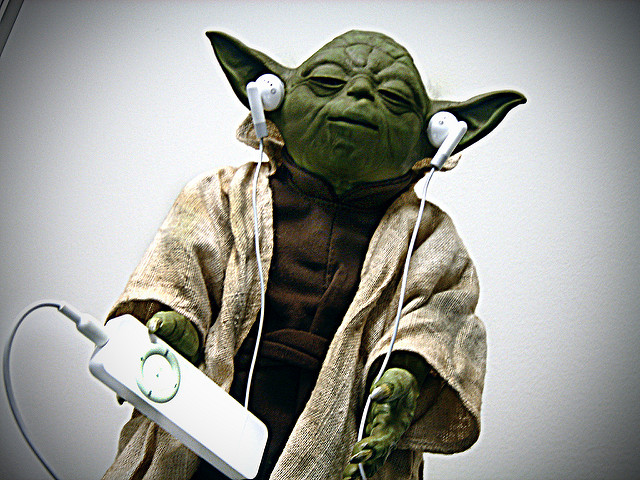I’ve noticed another flaw in my behavior. I’ve dubbed it the “email reflex.”
It starts with me sitting at my kitchen table. Then my hand picks up my iPhone. Not me, my hand. Before I know what’s happening, my finger, as if possessed, jabs the mailbox icon.
Often it takes several moments to load. I stare at the screen with Jedi-like intensity, waiting for a message to materialize. What I really need is for Yoda to whack me with his cane.
If the email reflex sounds familiar, that’s because it’s a well-subscribed boredom avoidance tactic here in the 21st century.
“Just think for a moment how much you might do in your life to avoid the feeling of boredom,” reflects author and meditation teacher Joseph Goldstein. “Somehow feeling bored is not okay.”
It’s true: our culture seems bent on avoiding this feeling. TV shows, magazines, books, smartphones, apps, tablets, newspapers, iPods—something is always within reach to keep our attention sated. We must stay busy with something. With anything.
Why? Because it protects us from feeling useless.
“This busyness serves as kind of an existential reassurance, a hedge against emptiness,” writes satirist Tim Kreider. “Obviously your life cannot possibly be silly or trivial or meaningless if you are so busy, completely booked, in demand every hour of the day.”
Human life doesn’t start this way. To be around a small child is to be around someone constantly fascinated by their surroundings. The sight of a goose, the smell of cinnamon, the sound of a hungry stomach—these are flashbulb events for a toddler.
But then the machine revs up. The little girl is shuttled from class to chess club to soccer to homework to TV time, with no second left unfilled. No time for gazing at clouds or chewing on blades of grass. No “me” time.
And when the kid finally does have a little downtime, she doesn’t care about the grass or clouds anymore. She cares about her iPad instead.
Yet the situation isn’t hopeless. Yes, mindless entertainment is everywhere. But we can still turn away.
Okay, it’s a bit more complicated than that. So let’s get into what happens when we feel the pull of technology, but decide to resist.
First there is a sense of panic. I’m missing out. What if she emailed me back? It can be hard, but don’t do anything about the panic. Just notice it.
Then a powerful urge arises. An urge to do. We contemplate cleaning the fridge, shaving, shaving the dog, whatever. Again, don’t do anything. Notice it.
If we watch closely here, we learn something about ourselves: we are addicted to doing. Our minds are slaves to activity-seeking, boredom-avoiding, habit patterns.
So how can we break these patterns? Just stop doing for a second.
“The joy of non-doing,” writes Jon Kabat-Zinn, “is that nothing else needs to happen for this moment to be complete.”
To be clear, Kabat-Zinn isn’t suggesting that we never act. We would starve. But most desires don’t have to be fulfilled to fade away. With time and attention, we can learn to see them for what they are: amorphous wisps appearing and disappearing in consciousness.
The key is that we don’t have to act on our impulses for them to go away.
Instead, when an impulse arises, we can watch our mind cycle through the rounds: panic, urgency, distraction. Then we are free to act mindfully—or not act at all.
And here’s the best part: when we take a keen interest in this mental process, it’s impossible to be bored.
So I’m working on noticing my email reflex. And mindfully abstaining from checking my messages. It’s a challenging, fulfilling, and sometimes painful effort at self-improvement.
But it’s certainly not boring.
~
~
Author: Brian Stanton
Image: Jonathan Powell/Flickr
Editor: Callie Rushton
Copy Editor: Travis May
Social Editor: Catherine Monkman







Read 4 comments and reply